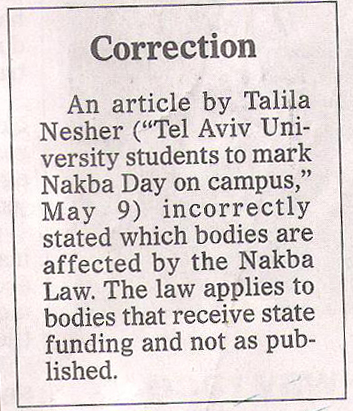On Thursday, before Americans woke up and visited the Ha’aretz Web site, CAMERA’s Israel office prompted Ha’aretz editors to correct online yet another case of “Ha’aretz, Lost in Translation,” the ongoing phenomenon in which the paper’s English translators downplay or expunge information about Arab violence and other wrongdoings, and insert false information about Israel.
While the original Hebrew article correctly described the so-called “Nakba Law,” which enables the Finance Minister to withhold government funding from state-funded bodies engaged in activities which reject the existence of the state of Israel as a Jewish state, the freewheeling English translators came up with their own creative version of the law.
The Hebrew edition correctly reported (CAMERA’s translation):
The law enables the finance minister to reduce or withhold budgeted funds to state-funded bodies, if among other things, they call for the rejection of the existence of the state of Israel. . . .
Here’s the English mistranslation, which inaccurately reports that the law is much more sweeping than it actually is, and which falsely states that it involves a fine:
In January, the High Court of Justice upheld the controversial Nakba Law passed by the Knesset in March, which fines bodies who openly reject Israel as a Jewish state.
Within hours of CAMERA’s Israeli staff pointing out the inaccurate English translation, editors commendably revised the online edition, which now states:
In January, the High Court of Justice upheld the controversial Nakba Law passed by the Knesset in March, which grants the Finance Minister the authority to reduce the budget of state-funded bodies that openly reject Israel as a Jewish state or mark the state’s Independence Day as a day of mourning.
In addition, the following day, Ha’aretz ran the following correction in the print edition:

Today, Ha’aretz announces the launch of its new English Web site and introduces digital subscriptions. About the new developments, publisher Amos Schocken writes to subscribers:
Following in the footsteps of other newspapers in the world, we are introducing new digital subscriptions that will enable us to provide you with accurate and comprehensive news coverage, analyses and commentary on Israel, the Middle East and the Jewish world.
Haaretz is dedicated to maintaining high journalistic standards in its presentation and interpretation of the riveting and complex reality of modern Israel. Haaretz’s role is vital not only as a trusted provider of information and insight but also as a gatekeeper of the liberal and democratic values on which this country was founded. Now more than ever, Haaretz has an important role to play in ensuring that Israel preserve its proper place among enlightened democracies, in fostering peace and reconciliation in the Middle East and in promoting greater understanding between Israel and the Jewish Diaspora. We invite our readers to be our partners in this great endeavor.
In the past few months, Haaretz has laid the groundwork for a significant enhancement of its online content, especially in English. With the introduction of our new, multi-platform digital subscriptions, Haaretz will extend and deepen its world renowned expertise in news gathering and analyses to many new arenas that are of special interest to our English-speaking readers.
